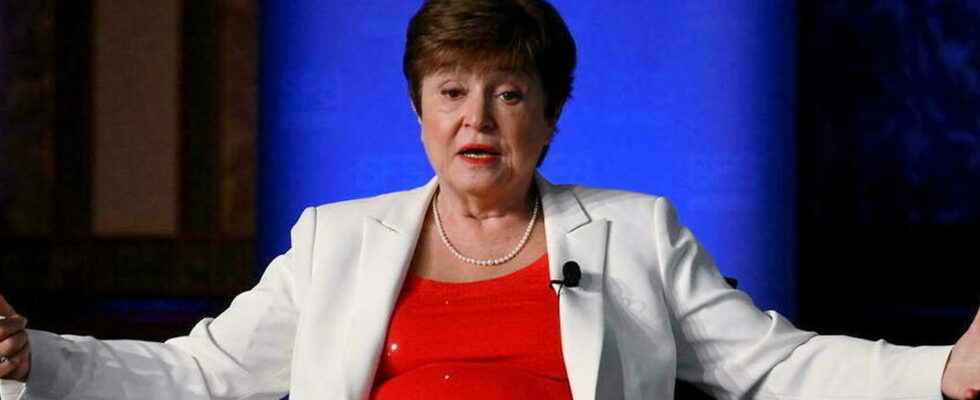HASanticipate to prevent the current difficulties from becoming the norm. Here is what Kristalina Georgieva, the Managing Director of the International Monetary Fund (IMF) offers. In a speech delivered Thursday in Washington, Kristalina Georgieva called on States and institutions to act together in the face of the growing risk of recession all over the world and to prevent “this period of fragility [devienne] a dangerous new normal”. Thus, the boss of the IMF called for “more will to act now and together”.
“There is an urgent need to stabilize the economy. […] At the IMF, we are calling for joint action” by States in order to anticipate future crises, insisted the Managing Director of the IMF, at the opening of the institution’s annual meetings, which are to be held in a week in Washington, entirely face-to-face for participants, for the first time since fall 2019.
The institution will publish its growth forecasts for the coming year on Tuesday, and these will be revised downwards, warned Kristalina Georgieva. In question, the multiplication of crises, reinforced by the consequences of the Russian war in Ukraine and the ecological disasters which hit several regions of the world this summer, coming a little more to destabilize a world economy already damaged by the Covid-19. The pandemic has marked a “fundamental shift for the global economy” added Kristalina Georgieva, moving from “a world of relative predictability” to “one subject to shocks and greater uncertainty”.
READ ALSOBaverez – Emerging countries, collateral victims of the war in Ukraine
As a result, the institution now expects a significant number of countries to experience at least two consecutive quarters of decline in their gross domestic product (GDP), a sign of recession, between the end of this year and 2023. A risk which should affect “about a third of the global economy” while “for many households around the world, even if growth is positive, they will feel like they are in a recession, because of the rising cost of life,” stressed Kristalina Georgieva. And it could even be worse: “uncertainty is extremely high, in a context of war and pandemic. There may be other economic shocks”. Therefore, the first priority is to prevent prices from continuing to soar, because “far from being transitory, inflation is setting in”, she estimated.
And, as central banks struggle by raising rates to slow the economy, failing to act now would require “even higher and persistent rates, which would cause even more damage to growth and jobs”, warned the boss of the IMF.
Risk of an extended debt crisis
Kristalina Georgieva also joins the president of the American central bank (Fed), Jerome Powell, acknowledging that reducing inflation “will not be easy and will not be painless in the short term”. Beware, however, of monetary tightening “too strong and too fast” and above all without coordination, warned the managing director of the IMF, at the risk of “plunging many economies into a prolonged recession”. Especially since the rise in the dollar, a consequence of that of the Fed’s key rate, complicates access to credit for many countries that borrow in this currency and have seen their debt increase as a result of the rise in interest rates. ‘interest.
“More than a quarter of emerging countries have defaulted or are at difficult levels, as well as more than 60% of low-income states,” worried Kristalina Georgieva. The risk: a debt crisis spreading to all of these countries. “The main lenders such as China or the private sector must take their responsibilities,” she insisted.
READ ALSOEconomic reforms: the IMF calls on Africa to be cautious
The G20 economy ministers are due to meet in Washington, along with central bank governors, on the sidelines of the IMF’s annual meeting next Wednesday and Thursday. In particular, they have the desire to move forward on the subjects of global taxation, regulation of the financial sector and even the financing of infrastructures.
If acting in the short term is essential, “it will not be enough to revitalize the global economy”, warned Kristalina Georgieva, who calls for “transformative reforms”, which the IMF intends to support. Among the points of attention, according to the Managing Director of the IMF, “investment in health, education, stronger safety nets are essential”, as well as digitization and the development of digital infrastructures. “We must respond to this period of instability […] stabilizing our economies in the face of immediate crises and building our stability in the face of future crises,” she concluded.
